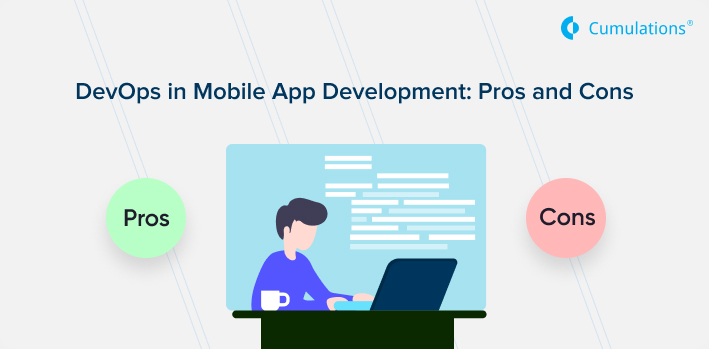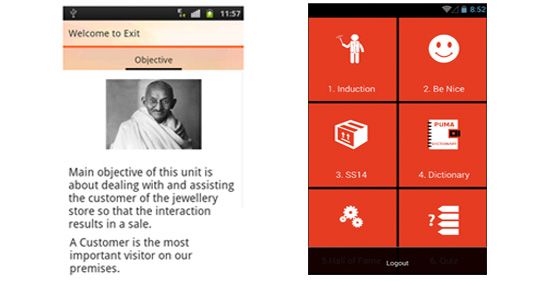
As an increasing number of business enterprises endeavor to beat the competition using technology, the process of app development has witnessed a paradigm shift.
For the last decade, businesses and mobile app development teams around the globe have been relying on agile methodology as a way to enhance the team’s competence and adaptability. However, with an improved focus on augmenting the business value of the app products, traditional methods are no more deemed adequate. There is a mounting need for improved ways to build and deploy software.
Consequently, DevOps in mobile app development is the new find that has emerged to create a holistic approach to software development and delivery.
But what exactly is DevOps and how does it work? Is it really beneficial for mobile app development? If yes, how to implement it in your business enterprise? Read on to find answers to all this and much more.
What is DevOps in mobile app development?
There is no right way to specifically explain what DevOps means. Typically, it is defined as a set of approaches that are aimed at facilitating the process of mobile app development between the developers and other team members. Owing to this incredible approach, mobile apps can be built, tested and deployed much faster and in a more reliable manner. Let’s understand this in detail.
Before DevOps, there was a lot of miscommunication between the release team and developers. After the code had been developed, it was passed on by the developers to the release team who were responsible for keeping it running. However, the release team lacked adequate knowledge of codebases. On the other hand, the developers did not know much about operational practices.
In simple words, the developers were responsible for the features of the app and they wanted things to get to the market quickly. But the release team were dealing with the stability of the app and wished to move slower to keep things stable. This often created mismanagement and tension within the organization.
So, in an attempt to reach a better scenario, DevOps service was introduced that facilitated a greater collaboration of the release team, mobile app developers in bangalore and the rest of the organization.
Significant Principles of DevOps
Today, an increasing number of business organizations are opting for DevOps in order to speed up the development process and evade downtime.
Going by the typical app development process, there are 4 main stages- Planning, Development, Testing and Deployment. Now with DevOps, every app development project is categorized into several smaller parts, which enables the creation of a fully-functional product in the shortest possible time span.
Moving on, the key principles of DevOps are as follows:
1. On-going Integration
This helps to identify any issue that occurs at the stage of coding. As soon as the developer implements any specific part of the code, it is saved inside a special section that is called the version control system. After this, the code is automatically checked and the project assembly is initiated. Based on the results, the developers can easily pinpoint the bugs and glitches in the code.
2. Automatic Testing
This enables the app developers to fix the bugs and glitches at the earliest, without waiting to get manual testing done. At this stage, the developers also perform application testing monitoring and load testing to see how the app will perform when millions of users open it simultaneously.
3. Continuous Deployment
With continuous deployment, it becomes extremely easy to expedite the process of app delivery, enabling the automatic installation of iterations in the most suitable environment. With the help of these principles, DevOps offers a much more iterative and flexible approach as compared to Agile.
Understanding DevOps as a Service
Now that we have understood what DevOps is, let’s see how to use this technology as a service.
DevOps-as-a-Service (DaaS) is a specially designed delivery model that implies to store all the core development tools within its cloud platform. This helps the developers to make use of a common toolset as well as track their actions.
By using this approach, the DevOps engineers can supervise the entire product’s journey and ensure that everything goes as smoothly as possible. This way they can easily know what tools and systems are best suited to your project. So, the process of app development becomes convenient and much faster.
DevOps in Mobile App Development- Pros
Using DevOps in mobile app development has a lot of advantages. Some of the most prominent ones are as follows:
With the DevOps approach, it takes much less time to create a fully-functional software product. The development processes that otherwise used to take weeks can be shortened to a few clicks or running a script instead.
In a DevOps environment, the entire team comes together to facilitate the release of new features and app improvements. The incredible combination of a shared codebase, automated testing and continuous integration results in a reliable product release.
DevOps promotes seamless communication and cooperation between the different departments and helps to find out and fix bugs quickly during the development stage.
Collaboration with cloud-based DevOps is an extremely hassle-free experience. All the tools that are accumulated into the cloud platform can be accessed by the users from anywhere.
DevOps in mobile app development facilitates faster testing and deployment. This is because, with the cloud, the release frequency enhances. Besides, developers can benefit from more data storage and computing power.
DevOps streamlines the complications involved in the process of data flow. The team members can simply focus on their own respective tasks and tools, without having to know how the entire toolchain works.
With DevOps, it is possible to get quick access to the professional DevOps engineers who can offer much-needed expertise on your project.
By using DaaS, you can get hold of a committed DevOps team that can make your in-house IT team understand various tools and systems in better detail.
DevOps in Mobile App Development- Cons
DevOps presents a completely different approach that requires adequate staff training. Besides, it requires the business to standardize all the procedures and processes. Integrating DevOps might require you to rebuild your team, and change the internal business process to meet the DevOps model. This is something that hinders most organizations.
A lot of companies prefer to go for continuous integration and continuous delivery process rather than test automation. However, DevOps cannot happen with automated testing.
The complete integration and exploitation of the DevOps approach involve heavy investment, both in terms of time and money.
Taking these cons into account, you should not blindly follow the trend and plunge into integrating this approach into your mobile app development processes. If you only update your product once a year and do not plan to create any new ones any time soon, DevOps might not be the best idea for you.
Related read:
1. Hybrid vs Native mobile App Development: which one you should choose in 2020


 +91-984-5825982 | +91-996-4689921
+91-984-5825982 | +91-996-4689921 sales@cumulations.com
sales@cumulations.com Send your requirement
Send your requirement 



